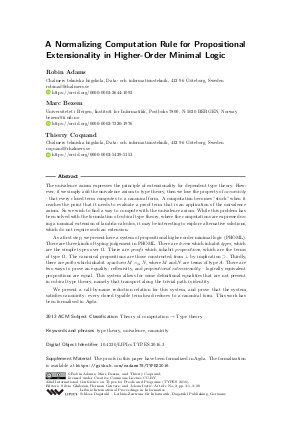A Normalizing Computation Rule for Propositional Extensionality in Higher-Order Minimal Logic
Authors Robin Adams, Marc Bezem, Thierry Coquand
-
Part of:
Volume:
22nd International Conference on Types for Proofs and Programs (TYPES 2016)
Part of: Series: Leibniz International Proceedings in Informatics (LIPIcs)
Part of: Conference: International Conference on Types for Proofs and Programs (TYPES) - License:
 Creative Commons Attribution 3.0 Unported license
Creative Commons Attribution 3.0 Unported license
- Publication Date: 2018-11-05
File

PDF
LIPIcs.TYPES.2016.3.pdf
- Filesize: 486 kB
- 20 pages
Document Identifiers
Subject Classification
Keywords
- type theory
- univalence
- canonicity
Metrics
- Access Statistics
-
Total Accesses (updated on a weekly basis)
0PDF Downloads0Metadata Views
Abstract
The univalence axiom expresses the principle of extensionality for dependent type theory. However, if we simply add the univalence axiom to type theory, then we lose the property of canonicity - that every closed term computes to a canonical form. A computation becomes "stuck" when it reaches the point that it needs to evaluate a proof term that is an application of the univalence axiom. So we wish to find a way to compute with the univalence axiom. While this problem has been solved with the formulation of cubical type theory, where the computations are expressed using a nominal extension of lambda-calculus, it may be interesting to explore alternative solutions, which do not require such an extension. As a first step, we present here a system of propositional higher-order minimal logic (PHOML). There are three kinds of typing judgement in PHOML. There are terms which inhabit types, which are the simple types over Omega. There are proofs which inhabit propositions, which are the terms of type Omega. The canonical propositions are those constructed from false by implication. Thirdly, there are paths which inhabit equations M =_A N, where M and N are terms of type A. There are two ways to prove an equality: reflexivity, and propositional extensionality - logically equivalent propositions are equal. This system allows for some definitional equalities that are not present in cubical type theory, namely that transport along the trivial path is identity. We present a call-by-name reduction relation for this system, and prove that the system satisfies canonicity: every closed typable term head-reduces to a canonical form. This work has been formalised in Agda.
Cite As Get BibTex
Robin Adams, Marc Bezem, and Thierry Coquand. A Normalizing Computation Rule for Propositional Extensionality in Higher-Order Minimal Logic. In 22nd International Conference on Types for Proofs and Programs (TYPES 2016). Leibniz International Proceedings in Informatics (LIPIcs), Volume 97, pp. 3:1-3:20, Schloss Dagstuhl – Leibniz-Zentrum für Informatik (2018)
https://doi.org/10.4230/LIPIcs.TYPES.2016.3
BibTex
@InProceedings{adams_et_al:LIPIcs.TYPES.2016.3,
author = {Adams, Robin and Bezem, Marc and Coquand, Thierry},
title = {{A Normalizing Computation Rule for Propositional Extensionality in Higher-Order Minimal Logic}},
booktitle = {22nd International Conference on Types for Proofs and Programs (TYPES 2016)},
pages = {3:1--3:20},
series = {Leibniz International Proceedings in Informatics (LIPIcs)},
ISBN = {978-3-95977-065-1},
ISSN = {1868-8969},
year = {2018},
volume = {97},
editor = {Ghilezan, Silvia and Geuvers, Herman and Ivetic, Jelena},
publisher = {Schloss Dagstuhl -- Leibniz-Zentrum f{\"u}r Informatik},
address = {Dagstuhl, Germany},
URL = {https://drops.dagstuhl.de/entities/document/10.4230/LIPIcs.TYPES.2016.3},
URN = {urn:nbn:de:0030-drops-98581},
doi = {10.4230/LIPIcs.TYPES.2016.3},
annote = {Keywords: type theory, univalence, canonicity}
}
Author Details
References
- Carlo Angiuli, Robert Harper, and Todd Wilson. Computational higher-dimensional type theory. In Giuseppe Castagna and Andrew D. Gordon, editors, Proceedings of the 44th ACM SIGPLAN Symposium on Principles of Programming Languages, POPL 2017, Paris, France, January 18-20, 2017, pages 680-693. ACM, 2017. URL: http://dx.doi.org/10.1145/3093333.3009861.
- Marc Bezem, Thierry Coquand, and Simon Huber. A Model of Type Theory in Cubical Sets. In Ralph Matthes and Aleksy Schubert, editors, 19th International Conference on Types for Proofs and Programs (TYPES 2013), volume 26 of Leibniz International Proceedings in Informatics (LIPIcs), pages 107-128, Dagstuhl, Germany, 2014. Schloss Dagstuhl-Leibniz-Zentrum fuer Informatik. URL: http://dx.doi.org/10.4230/LIPIcs.TYPES.2013.107.
- Cyril Cohen, Thierry Coquand, Simon Huber, and Anders Mörtberg. Cubical type theory: a constructive interpretation of the univalence axiom. CoRR, abs/1611.02108, 2016. URL: http://arxiv.org/abs/1611.02108.
-
Jean-Yves Girard. Proofs and Types. Cambridge University Press, 1989.

-
Martin Hofmann. Syntax and semantics of dependent types. In Semantics and Logics of Computation, pages 79-130. Cambridge University Press, 1997.

- Simon Huber. Canonicity for cubical type theory. CoRR, abs/1607.04156, 2016. URL: http://arxiv.org/abs/1607.04156.
- Daniel R. Licata and Robert Harper. Canonicity for 2-dimensional type theory. In John Field and Michael Hicks, editors, POPL, pages 337-348. ACM, 2012. URL: http://dx.doi.org/10.1145/2103656.2103697.
-
Zhaohui Luo. Computation and Reasoning: A Type Theory for Computer Science. Number 11 in International Series of Monographs on Computer Science. Oxford University Press, 1994.

- Andrew Polonsky. Internalization of extensional equality. CoRR, abs/1401.1148, 2014. URL: http://arxiv.org/abs/1401.1148.
-
W. W. Tait. Intensional iinterpretation of ffunctional of finite type i. Journal of Symbolic Logic, 32:198-212, 1967.

- The Univalent Foundations Program. Homotopy Type Theory: Univalent Foundations of Mathematics. The Univalent Foundations Program, Institute for Advanced Study, 2013. URL: https://homotopytypetheory.org/book.
